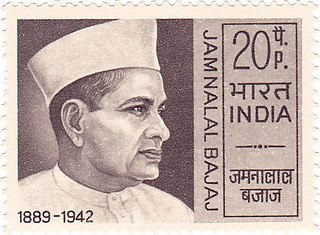
Jamnalal Kaniram Bajaj was an Indian businessman and politician. He founded the Bajaj Group of companies in the 1920s, and the group now has 24 companies, including six that are listed on the bourses. He was also a close and beloved associate of Mahatma Gandhi, who is known to have often declared that Jamnalal was his fifth son.
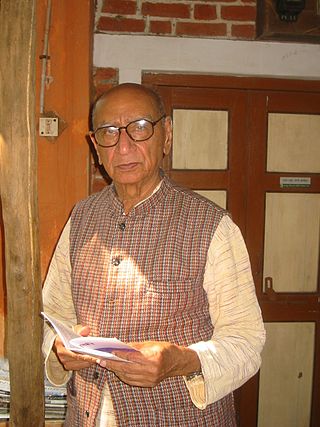
Narayan Desai was an Indian Gandhian and author.
The Karan or Karana is a community found in the state of Odisha in India. The post of Karana used to be a professional designation that was occupied by literate peoples. They held Karanam posts in some parts of Andhra Pradesh, where they speak Odia and played a similar role in Odisha to that of the Kayasthas of West Bengal and Bihar. In the social hierarchy of Odisha they rank next to Brahmins. They exclusively served the ruling powers as their ministers, advisors, governors, military commanders, record keepers and dewans. They owned most Zamindaris in Odisha. They have the highest literacy caste-wise and are highly prosperous. Today they are a politically dominant community and have reigned over the politics of Odisha for 50 years.

Malati Devi Choudhury was an Indian civil rights and freedom activist and Gandhian. She was born in 1904 in an upper middle class Brahmo family. She was the daughter of Barrister Kumud Nath Sen, whom she had lost when she was only two and a half years old, and Snehalata Sen, who brought her up.
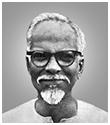
Nabakrushna Choudhury was an Indian politician and activist. He served as Chief Minister of the Indian state of Odisha. He was a freedom fighter who participated in the Non-cooperation Movement, the Civil Disobedience movement, and the Peasant movement.

Gopabandhu Das (1877–1928), popularly known as Utkalamani Gopabandhu Das, was a social worker, reformer, political activist, journalist, poet and essayist.

Janaki Devi Bajaj was an Indian independence activist who was jailed for participating in Civil Disobedience Movement in 1932.

Ramadevi Choudhury, also known as Rama Devi, was an Indian freedom fighter and a social reformer. She was called Maa (Mother) by the people of Odisha. The Ramadevi Women's University in Bhubaneswar has been named after her.

Pandit Nilakantha Das (1884-1967) was one of the most illustrious sons of Odisha, who appeared both in its political and literary arena at the most crucial period of its history, when Odisha had no political identity in the map of India, and Odia as a language was about to be extinct. He worked relentlessly for Odisha's recognition both politically and linguistically, and helped bring to fruition the dreams of Utkala Gaurab Madhusudan Das, Utkalamani Gopabandhu Das and all other Odia loving people.
Thakurdas Bang was an Indian Gandhian philosopher and Gandhian economist. He was involved in the Indian independence movement. He practised Gandhism, Gandhian philosophy, Gandhian study even at the age of 95. He was also involved in Khadi and Sarvodaya movements. As an economic professor in G S College of Commerce he motivated many students like Madhukarrao Chaudhari, Justice Chandrashekhar Shankar Dharmadhikari and Ramakrushna Bajaj to participate in the freedom struggle. He is succeeded by Abhay Bang and Ashok Bang. Ashok Bang decided to work for issues related to farming and Abhay decided to work for health of villagers. Abhay and Rani Bang founded SEARCH - a non-profit organization in Gadchiroli, which is involved in rural health service and research
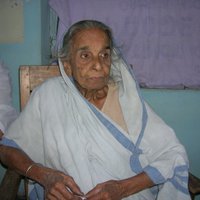
Annapurna Choudhury was an India pro-independence activist active in the Indian independence movement. She was also a prominent social and women's rights activist. Maharana was a close ally of Mahatma Gandhi.
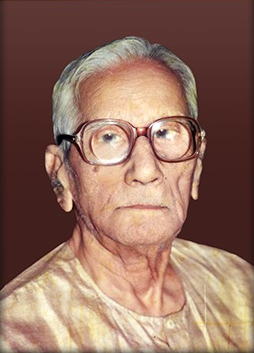
Dr. Radhanath Rath was a newspaper editor, freedom fighter, social worker and politician from Odisha. He was the editor of The Samaja, one of the leading newspapers of Odisha.
Kujendri is a small village of Rayagada district in the state of Odisha, India. There is a Govt. High school of welfare department since 1949. The veteran Gandhian and Jamnalal Bajaj award winner Biswanath Pattnaik came to kujendri in around 1940, founded Banabasi Seva Samiti and worked for the development of local tribal people. The village is well known as the birthplace of the tribal lady freedom fighter Sandi Sabara. who met Sri Patnaik there and worked in the Bhoodan movement. Kujendri was an important place in the history of Bhoodan movement. The Bhoodan activists in a padayatra, in the leadership of Acharya Vinoba Bhave reached here on 8 March 1952 and mobilized the people of the area to donate lands. It also has a temple-"Trinath temple", built by late shri Appana choudhury.

Shobhana Ranade was an Indian social worker and Gandhian, known for her services towards her cause of destitute women and children. The Government of India honoured her in 2011, with the Padma Bhushan—the third highest civilian award—for her services to the society.
Chunibhai Vaidya, popularly called Chunikaka, was an Indian activist, author and a Gandhian ideologue from Gujarat, India.

Rabindra Nath Upadhyay (1923–2010) was an Indian social worker, Gandhian and the founder of Tamulpur Anchalik Gramdan Sangha (TAGS), a non governmental organization working for the social development of the rural people in the Kumarikata village of Assam. He was a recipient of the 2003 Jamnalal Bajaj Award. The Government of India awarded him the fourth highest civilian award of the Padma Shri, in 2000, for his services to the society.
Padmanabha Pillai Gopinathan Nair was an Indian social worker, Gandhian, independence activist, and the chairman of Mahatma Gandhi National Memorial Trust.

Gopabandhu Choudhuri was an Indian activist, social worker and freedom fighter. He participated in the Non-cooperation Movement, Civil Disobedience movement.

Shanti Devi was an Indian social worker born in 1934 in Balasore district of Indian state of Odisha. She was awarded the Padma Shri award on 9 November 2021 by the President, Ram Nath Kovind at the Civil Investiture Ceremony-IV, at Rashtrapati Bhavan for her social works and efforts to bring peace in the Maoist-affected Rayagada region of Odisha. Devi received the Radhanath Rath Peace Award and was awarded the Jamnalal Bajaj Award in 1994.

Braja Sundar Das was a multifaceted Indian statesman, freedom fighter, politician, poet, littérateur, and social reformer who played a significant role in shaping the socio-political and cultural landscape of Odisha.














